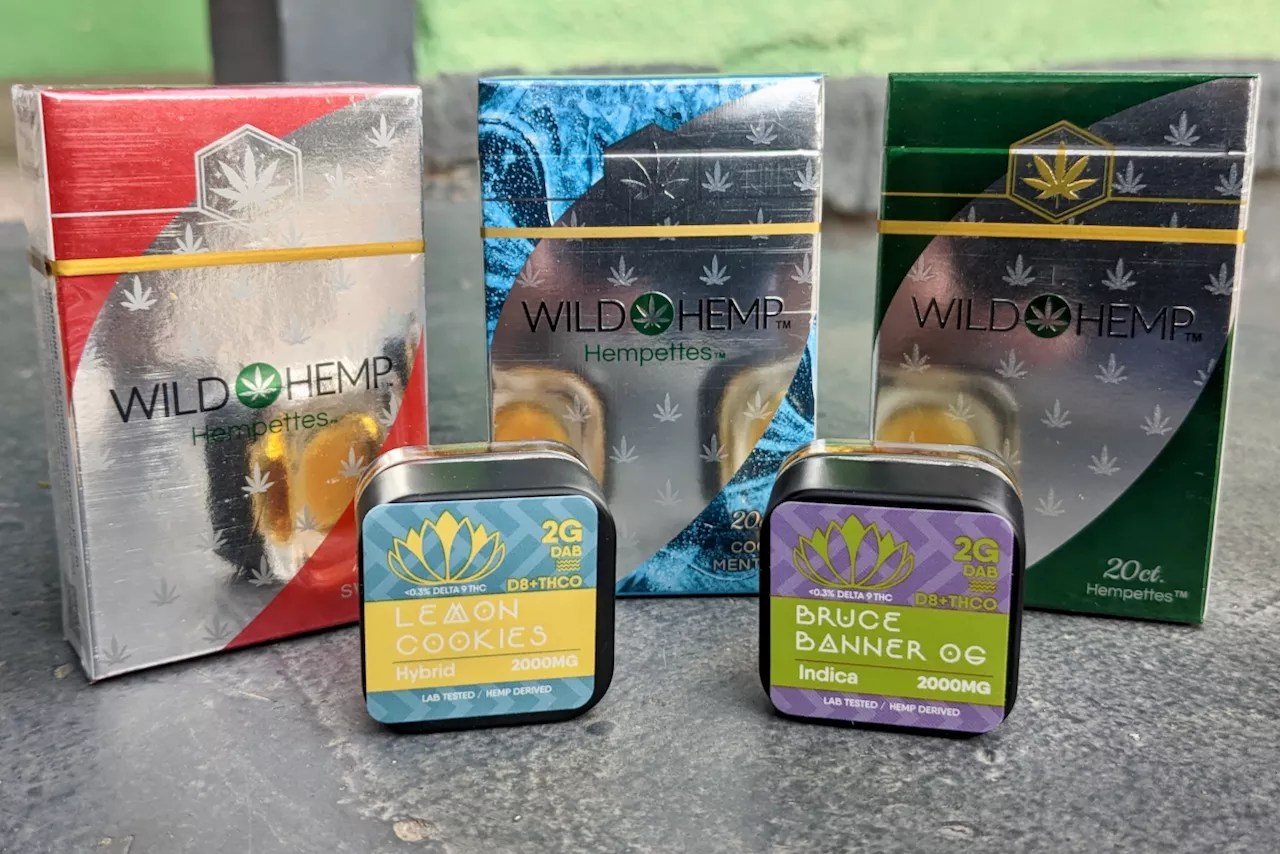
Mario Tama/Getty Images

Audio By Carbonatix
Arizona law bars the sale of “diet weed” products like delta-8 THC in smoke shops and convenience stores, Attorney General Kris Mayes said.
But proponents of the hemp industry say the effect of a formal legal opinion that Mayes issued Monday goes far beyond the hemp-based intoxicants and will likely also sweep up the entirety of the CBD marketplace in Arizona, barring sales of products used to improve sleep and reduce body aches and pains.
And it may prompt litigation aimed at having the courts determine exactly how Arizona’s hemp and marijuana laws ought to be enforced.
Mayes, a Democrat, concluded in her opinion that, while federal law may allow for intoxicating substances to be made from hemp derivatives, Arizona law expressly regulates how such products are sold.
And that means they must be regulated by the Arizona Department of Health Services and only sold in dispensaries that are licensed to sell medical and recreational cannabis products.
Delta-8 is an intoxicating cannabinoid with a chemical profile and psychoactive effect materially similar to that of marijuana, but that is synthesized from the hemp plant. It is a chemical analog of delta-9, the primary psychoactive element that occurs naturally in marijuana.
Products made with delta-8 THC, including vape cartridges and gummies, are currently on sale in smoke shops across Arizona.
They have largely existed in a legal gray area in Arizona, with the hemp industry relying on congressional action in 2018, when that year’s annual Farm Bill expanded the definition of hemp to include “all derivatives, extracts, cannabinoids, (and) isomers” of the hemp plant. That paved the way for making delta-8, which is chemically synthesized from the naturally occurring cannabidiol into an intoxicating concentration.
Arizona voters have approved both medical and recreational marijuana in the state, but the industries are highly regulated, and licenses to operate are expensive. Arizona lawmakers this year are considering legislation backed by the hemp industry that would add more regulations to the sales of delta-8 THC products.
After the 2018 Farm Bill, production and sales of delta-8 THC products proliferated in Arizona, as they were seen as outside the scope of the state’s cannabis laws.
But Mayes said that simply isn’t the case. Arizona allows for “industrial hemp” production, but state law strictly defines those products to excluded derivatives and extracts – basically all delta-8 THC products – and explicitly says hemp products “made to be ingested” except those made of the hemp seed are not legal. And since the state’s hemp law doesn’t list inhalable products, like vape cartridges, those are also illegal to sell outside of dispensaries.

A legal opinion on Monday from Arizona Attorney General Kris Mayes threatens to quash the sale of delta-8 THC products in smoke shops and gas stations.
Matt Hennie
‘It’s a wrongheaded approach to marijuana policy’
Mayes has effectively handed the existing marijuana industry a monopoly, said Jon Udell, the communications director for Arizona’s NORML chapter. NORML has backed legislation seeking to regulate the sale of delta-8 THC and similar projects in Arizona.
“This is Attorney General Mayes giving the marijuana industry something that the legislature would not,” he said. “It’s a disappointing outcome.”
Udell noted that legislation backed by the Arizona Dispensaries Association, which represents licensed cannabis retailers in the state, has been introduced in recent years that would do everything from outright ban hemp-derived THC products to making them legal to sell only at dispensaries.
Mayes’ legal opinion effectively does the latter, Udell said.
He noted that, in 2022, the Arizona Dispensaries Association chipped in $40,000 to a political committee that went on to spend more than $367,000 to help Mayes get elected. Mayes won the attorney general’s race over Republican Abe Hamadeh by just 280 votes.
Ann Torrez, the executive director of the Arizona Dispensaries Association, said her organization was pleased with Mayes’ findings.
“We believe it reflects the intent of Arizona’s voters and most importantly is in the best interest of public health and safety,” she said in an email to the Arizona Mirror.
Tom Dean, a Phoenix attorney who specializes in cannabis law, said Mayes’ opinion reads like a point-by-point rebuttal of a legal analysis he provided to her office in late 2023. Dean’s analysis concluded that hemp-based THC products were legal under Arizona and federal law.
Dean said he was disappointed in Mayes’ findings, which aren’t legally binding, and said the legal dispute over delta-8 THC and similar products warrants litigation. He said he is interested in building a coalition to seek a declaratory judgment from the courts to settle the matter once and for all.
“It’s just yet another example of what I think is a wrongheaded approach to marijuana policy in general,” he said.
Of particular concern for both Dean and Udell is how the opinion will affect CBD sales in Arizona. CBD products generally do not contain THC, the psychoactive element in marijuana, because they are made from hemp plants, which contain scant amounts of THC.
Mayes wrote in a footnote in her opinion that her conclusions only apply to “intoxicating” hemp-based products, and CBD production and sales are exempted from her findings. But both Dean and Udell said they don’t see how she can interpret the state’s hemp laws one way for delta-8 THC and another for CBD, given that they’re both made from the same plant.
“There’s absolutely no legal distinction between CBD and delta-8,” Dean said. “They want to treat CBD differently, but they can’t.”
This story was first published by Arizona Mirror, which is part of States Newsroom, a network of news bureaus supported by grants and a coalition of donors as a 501c(3) public charity. Follow Arizona Mirror on Facebook and Twitter.